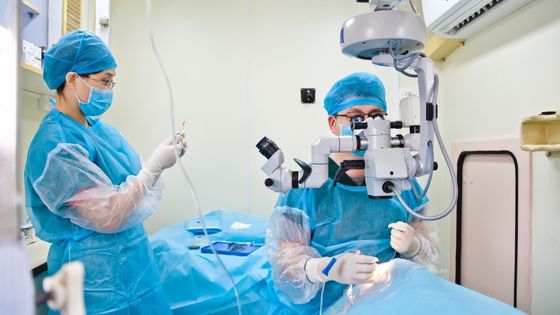If you are one of the millions of people who suffer from cataracts, you may be considering surgery to correct the problem. Cataract surgery is a common procedure, and most people have a successful recovery. However, it is important to know what to expect before you undergo surgery.
Understanding cataracts and a cataract surgery
Cataracts are a clouding of the eye’s lens. They can occur slowly over time, and often affect people as they age. Cataracts can make it difficult to see clearly and may cause glare or double vision. For instance, you may find it difficult to read or drive at night. Cataracts are not usually painful, but if they become severe, they can cause vision loss. In some cases, cataracts may even lead to blindness. There is no way to prevent cataracts, but luckily, they can be treated with surgery.

Cataract surgery is a procedure to remove the cloudy lens of your eye and replace it with a clear artificial one. The surgery is typically finished on a short-term premise, and that implies you can return home that very day.
How is the surgery performed?
Cataract surgery is usually done with a local anesthetic, which numbs the area around your eye. You will be alert during the system, yet you won’t feel any pain. During surgery, your doctor will make a small incision in your eye and then remove the cloudy lens. They typically use an ultrasound device to break up the lens so it can be removed more easily. Once the lens is removed, your doctor will place the artificial lens in your eye. The incision is then closed with stitches or a special type of tape.
In some cases, you may need to have cataract surgery in both eyes, but usually, the surgery can be done on one eye at a time. Once the lens is removed, your doctor will place the artificial lens in your eye. To complete the surgery, the incision is then closed with stitches or a special type of tape.
Does the procedure come with any risks?
Cataract surgery is generally safe, but like any surgery, there are some risks involved. One of them is infection. This is why it’s important to take care of your eye and follow your doctor’s instructions after surgery.
Another risk is that the artificial lens may not be placed correctly. This can cause blurred vision or twofold vision. In rare cases, the artificial lens may dislodge from its position. If this happens, you will need to have another surgery to fix it. Ultimately, if your surgery is performed by qualified Orlando cataract surgeons or surgeons in your local area, the risks are minimal.
What can you expect after surgery?
After cataract surgery, your vision will be improved. However, it may take some time for your vision to fully recover. In the meantime, you may need to wear glasses or contact lenses. Most people have mild discomfort after surgery, but this usually goes away within a few days. You may also have some blurry vision and see glare or halos around lights. These side effects are usually temporary and will go away as your eye heals.
You will need to take it easy for the first week or so after surgery. You shouldn’t do any hard work or exhausting movement. You will also need to avoid getting soap or water in your eye for at least a week.
You will need to see your doctor for follow-up appointments so they can check on your progress. It is important to keep all of your appointments and take care of your eyes as directed.
How to prepare for cataract surgery
If you have been diagnosed with cataracts and your doctor has recommended surgery, there are some things you can do to prepare. First, you will need to have a complete eye exam. This is so your doctor can determine if cataract surgery is the right option for you. You will also need to stop taking certain medications, such as blood thinners and diabetes medication. These can build the gamble of intricacies during surgery. Be sure to follow your doctor’s instructions on how to prepare for surgery. This will help ensure that the procedure goes smoothly and that you have a successful outcome.
Conclusion
Cataract surgery is a common and safe procedure that can improve your vision. It is important to understand the risks and what to expect before undergoing surgery. By doing so, you can be sure that you are making the best decision for your eye health.
